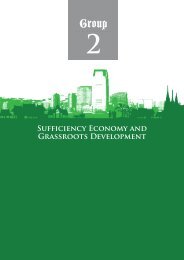Conflict, Legitimacy and Government Reform: Equitable Allocation of ...
Conflict, Legitimacy and Government Reform: Equitable Allocation of ...
Conflict, Legitimacy and Government Reform: Equitable Allocation of ...
Create successful ePaper yourself
Turn your PDF publications into a flip-book with our unique Google optimized e-Paper software.
180 KPI Congress XI<br />
media. In the provision <strong>of</strong> these services, LAO still have minor roles, does<br />
not engage in service provision or is still at an early stage <strong>of</strong> development.<br />
Thus, service provision will be a challenging task <strong>of</strong> LAOs in the future.<br />
This article has the following assumptions.<br />
First, there is a possibility that there will be new developments <strong>of</strong><br />
local administrative organization in Thail<strong>and</strong> with respect to creation <strong>of</strong><br />
equity in the society. To this end, equity must be clearly defined <strong>and</strong><br />
what the people are lacking must be identified by considering readiness<br />
<strong>of</strong> LAO’s financial <strong>and</strong> fiscal resources. It is anticipated that these new<br />
developments will progress gradually, that is, creating “innovation” <strong>of</strong> the<br />
provision <strong>of</strong> quality <strong>of</strong> life services in leading local organizations. After<br />
these services have been proven popular among the general public, they<br />
would be replicated in other LAOs. However, “massive changes” may<br />
occur, provided that the government lends its support.<br />
Second, regarding the reform <strong>of</strong> local public services to mitigate<br />
partiality, LAOs do not have to undertake such reform alone. Support<br />
from the government or collaboration with other sectors such as the<br />
business sector that desires to demonstrate its corporate social<br />
responsibility (CSR) as well as inter-disciplinary approaches will ensure<br />
the success <strong>of</strong> this project, rather than acting alone.<br />
Third, conditions <strong>of</strong> the success <strong>of</strong> new public services with respect<br />
to education-health-welfare <strong>and</strong> so forth rest on new knowledge,<br />
requiring that LAO <strong>of</strong>ficers need to adjust themselves. This is because<br />
quality <strong>of</strong> life <strong>of</strong> the people is a sensitive topic <strong>and</strong> such problems are<br />
individualistic. Therefore, remedial approaches must be suitable for each<br />
individual <strong>and</strong> solutions should not be one size fits all.<br />
The content <strong>of</strong> this article consists <strong>of</strong> five parts. Part 2 discusses<br />
about equity-related principles <strong>and</strong> theories <strong>and</strong> their application to the<br />
contexts <strong>of</strong> Thai locality, starting from a review <strong>of</strong> numerous examples <strong>of</strong><br />
“inequity.” For instance<br />
a) Children/teenagers in a poor family lacking opportunities to<br />
attain a higher level <strong>of</strong> education (vocational level or higher














